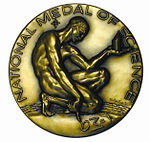Нацыянальны навуковы медаль ЗША
Нацыянальны навуковы медаль (англ.: National Medal of Science; у некаторых крыніцах тлумачыцца як Нацыянальны медаль навукі) — амерыканская дзяржаўная ўзнагарода за выдатны ўклад у вобласці біялагічных, фізічных, матэматычных, тэхнічных, хімічных, грамадскіх ці паводзінскіх навук.
| Нацыянальны навуковы медаль ЗША | |
|---|---|
 |
|
| Арыгінальная назва | англ.: National Medal of Science |
| Краіна | |
| Тып | навуковая ўзнагарода[d] і медаль |
| Кім уручаецца | National Science Foundation[d] |
| Дата заснавання | 1963 |
| Статус | уручаецца |
| Сайт | nsf.gov/od/nms/me… (англ.) |
Агульныя звесткі
правіцьМедаль прысуджаецца Прэзідэнтам ЗША па рэкамендацыі Камітэта Нацыянальнага навуковага медаля, які складаецца з 12 вучоных і інжынераў. Медаль быў заснаваны 25 жніўня 1959 года Кангрэсам ЗША спецыяльным Законам (Public Law 86-209) і першапачаткова прызначаўся толькі для прыродазнаўчых абласцей («physical, biological, mathematical, or engineering sciences»). У 1980 годзе гэты пералік быў дапоўнены грамадскімі дысцыплінамі (social and behavioral sciences) паводле Закона ад 12 снежня (Public Law 96-516). Уручэнне праходзіць у Белым Доме.
Знакамітыя лаўрэаты
правіцьДа лістапада 2009 года медаль атрымалі больш за 450 чалавек, сярод іх Нобелеўскія лаўрэаты і іншыя вядомыя вучоныя.
| Год | Лаўрэат | Арыгінальная фармулёўка ўкладу |
|---|---|---|
| 1963 | Вэнівар Буш | «For his distinguished achievements in electrical engineering, in the technology of computing machines, in the effective coupling of the physical and life sciences; and in his mobilizing science, engineering and education in enduring ways in the service of the Nation.» |
| 1963 | Норберт Вінер | «For his marvellously versatile contributions, profoundly original, ranging within pure and applied mathematics, and penetrating boldly into the engineering and biological sciences.» |
| 1969 | Эрнст Майр | «For notable contributions to systematics, biogeography, and the study of birds, and especially for great work on the evolution of animal populations.» |
| 1970 | Барбара Мак-Клінтак | «For establishing the relations between inherited characters in plants and the detailed shapes of their chromosomes, and for showing that some genes are controlled by other genes within chromosomes.» [1] |
| 1974 | Лайнус Полінг | «For the extraordinary scope and power of his imagination, which has led to basic contributions in such diverse fields as structural chemistry and the nature of chemical bonding, molecular biology, immunology, and the nature of genetic diseases.» |
| 1975 | Вернер фон Браўн | «For his work in making the liquid-fuel rocket a practical launch vehicle and for individual contributions to a series of advanced space vehicles, culminating in the Saturn series that made the Apollo program possible.»* |
| 1976 | Эдвард Осбарн Уілсан | «For his pioneering work on the organization of insect societies and the evolution of social behavior among insects and other animals.» |
| 1979 | Севера Ачоа | «Ochoa continued research on protein synthesis and replication of RNA viruses until 1985, when he returned to Spain and gave advice to Spanish science policy authorities and scientists.» |
| 1979 | Рычард Фейнман | «In recognition of his essential contributions to the quantum theory of radiation and to his illumination of behavior of constituents of the atom, of the atomic nucleus, and of the subnuclear particles.» |
| 1982 | Эдвард Тэлер | «For his outstanding contribution to molecular physics, understanding the origin of stellar energy, the theory and application of fusion reaction, the field of nuclear safety, and for his continued leadership in science and technology.» |
| 1989 | Самуэль Карлін | «For his broad and remarkable researches in mathematical analysis, probability theory and mathematical statistics, and in the application of these ideas to mathematical economics, mechanics, and population genetics.» |
| 1990 | Леанід Гурвіч | «For his pioneering work on the theory of modern decentralized allocation mechanisms.» |
| 1990 | Джон Мак-Карці | «For his fundamental contributions to computer science and artificial intelligence, including the development of the LISP programming language; the mathematical theory of computation; the concept and development of time-sharing; the application of mathematical logic to computer programs that use commonsense knowledge and reasoning; and the naming and thus the definition of the field of artificial intelligence itself.» |
| 1997 | Джэймс Дзюі Уотсан | «For five decades of scientific and intellectual leadership in molecular biology, ranging from his co-discovery of the double helical structure of DNA to the launching of the Human Genome Project.» |